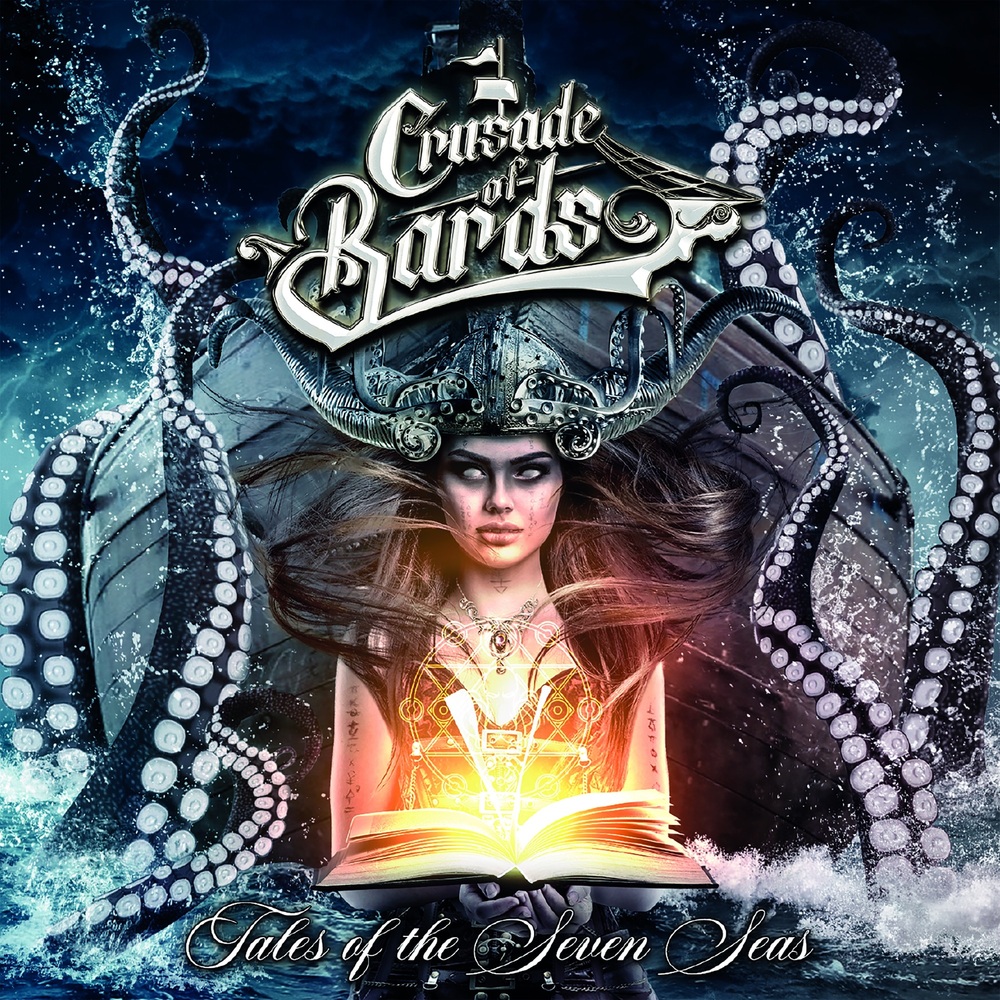 |
Country: Spain
Style: Symphonic Metal
Rating: 7/10
Release Date: 18 Feb 2022
Sites: Facebook | Instagram | Metal Archives | Twitter | YouTube
I have to admit that this album stood out from the morass of February releases because of its art, but I'm always up for symphonic metal from Spain anyway and a little research demonstrated that two of the six members of Crusade of Bards also play for Sechem, an excellent folk metal band, so it ended up being a gimme for me. I should add those six members also include two lead vocalists, Captain Eleanor Tenebre and Eduardo Guilló, neither of whom play an instrument, spending their time weaving their melodies together in a very classy fashion.
I liked this from the outset, because of the strange and unusual intro, called Anuri. I've listened to a lot of intros lately and I can't remember the last one that had a valid reason to exist. This one is exactly what an intro ought to be though. It carries a firm sense of expectation, as if we're all at a live gig and the band is about to enter the stage. It builds magnificently as well, hinting at what's to come over the next hour. When it gives way to The Northwest Passage, I saw the band chase out and the lights come up and an ocean of horns ablaze.
I haven't heard Crusade of Bards before, though this is their second album, after their 2019 debut, Tales of Bards & Beasts. They're overtly symphonic metal, layering those two voices over a speedy power metal base with occasional side trips into folk metal. It's mostly up tempo stuff, uplifting as well because of those multiple vocals and how they echo. Importantly, when it calms down, like it does midway through The Northwest Passage, the energy doesn't dissipate at all, instead hanging in the air during an interesting instrumental section. Of course, it speeds up again later.
What's unusual about that first song proper is Tenebre's voice, because it's very high indeed as a contrast to the deep male voice of Guilló. I don't want to suggest that it's jarring, because it isn't; it's beautifully, professionally done and she does exactly what she wants to do with it. However, it is much higher than I expected at the very outset and it gets higher still later on, sometimes to a shocking degree. I did get used to it pretty quickly and applaud such a unique delivery, but I had to wonder, on songs like The White Witch, how she would have sounded an octave lower.
There's a lot of music here, this album almost reaching an hour in length, twenty minutes longer than the debut, but it never felt long to me. The songs certainly aren't long, none of the fourteen on offer over six minutes, with an intro, outro and sub-thirty second interlude in the middle. It's a versatility within their sound that keeps it all fresh, I think, along with that continually uplifting aspect. Every time a song finishes, we want another to start, and that holds true when the album ends.
Dunkirk Privateers brings in the folk element, starting out as a sea shanty with a prominent early accordion, though it's never as prominent in the mix as a folk metal band would position it. Lies & Ashes returns to the shanty mindset but the notably folky nature of Samudr Ka Mandir is folk not folk metal, if we can remember the difference. Leap of Faith brings in what sound like a fiddle and a tin whistle. And waves. And seagulls. They're definitely mining their theme well, though I wasn't able to follow a narrative flow that might constitute a concept album. Maybe it is. I can't say.
I was too busy enjoying the vocals as music to pay much attention to the lyrics they were delivering entirely, I believe, in English. I should mention here that it isn't just a constant duet between high and low voices. Guilló had hinted early in the album that he wasn't going to stay entirely clean on everything and Vento Aureo is where he goes deliberately harsh, albeit not throughout. There's a strong beauty and the beast contrast on Naupaktos and it's even more varied on Hasard, which is notable for being a much softer song, with smooth male and female vocals, that heavies up later into a harsher, more impactful piece.
I like this a lot. Describing what Crusade of Bards do may not be too challenging but they bring an agreeably different approach to their chosen genre that sets them apart from their counterparts who have less uniqueness to offer. Much of it is due to Tenebre, who is easily distinguishable from all the many other able female symphonic metal vocalists. However, the more I let this album play on repeat, the more I value Guilló's part in the vocals.
And I don't want to make it all about them. The music behind them is more routine than they are but there are so many moments where the band spin interesting instrumental sections, often out of nowhere. This starts early with The Northwest Passage, if we treat Anuri separately—if not, it's right there in that magical intro—and continues throughout. Sometimes they're longer sections, a few of which get into neo-classical without ever becoming pure shred. Often, though, they're the briefest sections, like one in Naupaktos that makes me grin every time I hear it. These are easy to just skip over in our minds until the next vocal section, but I don't wanna. They speak to me.
No comments:
Post a Comment